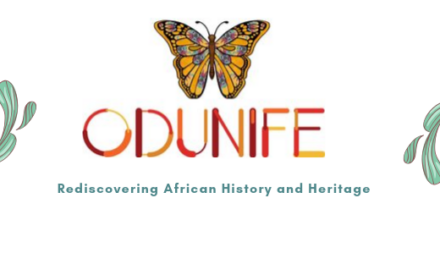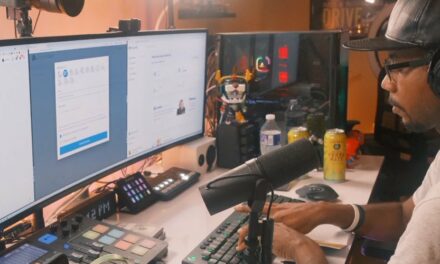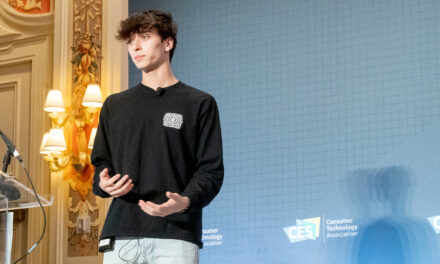Entrepreneurs: Adam Barrie and Lee Wilcox
Biz: On the Tools
Tilt: Funny “on-site” videos for builders and tradespeople
Channel: Facebook Followers: 4.3M
Our Favorite Actionable Advice
- Keep your eyes open: Their first product was an app. But they realized the real value was the audience they developed through their content marketing.
- Do it better: Brands were willing to pay to access their audience, but their content was boring. On the Tools expanded their brand deals by creating the content themselves (and it resonated far better with their audience.)
- Embrace the power of one: Though tempted to be on multiple platforms, they stuck to Facebook for the first years and focused on a single audience.
The Story:
Adam Barrie and Lee Wilcox went into business to create an app to connect tradespeople to jobs in the United Kingdom.
But a funny thing happened. They created a Facebook page On the Tools, posting curated pranks, fails, jokes, and other humorous videos that happened on worksites. They wanted to build an audience to whom they could market the app. Instead, they found a content business.
“What quickly happened after we started posting content was that people started to engage, follow the page, and then they started sending videos to us. That sparked a content strategy, where we would license the clip, post it back out and allow it to gain traction,” Lee says.
Within three months, the account hit 250K followers. “It was like a pub for sharing funny stories, and (tradespeople) loved it. It is their community; they built it. We are just operating it for them,” Adam says.
In 2014, Adam and Lee had full-time jobs. After work, Lee would spend six hours reading about 150 messages and watching 100 videos to pick the one to post the next day.
Founders quit day jobs
About a year later, the two thought about monetizing the audience. They asked the community for slogan ideas and printed them on T-shirts and hoodies. The first week they sold about $1K USD (£800) in merch and Lee quit his job. They sold about $20K USD (£15K) in the first month. Two months in, Adam left his full-time job to focus on content development.
Eventually, the app business was gone and their Facebook followers had grown to 1.5M. Sticking with Facebook was a conscious decision.
“If we had gone on five channels, we wouldn’t have the same power. We would have been crap on five rather than amazing on one,” Adam says. “Now we’ve grown, we have the opportunity and structure to expand on all channels. But at that time, it was really about understanding one channel – you need a channel to lean into.”
Studying viral criteria
They also had a strategy about understanding what posts worked best. They noted the title, content, number of content, and time stamps for each post. Each day, they posted eight to 10 times. And they eventually knew within the hour if a post had viral potential.
They developed a creative checklist and soon honed their process so they knew its popularity potential in five minutes. (They found the prime time to post was 12:15 p.m. when tradespeople took their lunch break. By 12:20 p.m., they could see its potential – or lack thereof.)
Brands want to do deals
Brands also came calling, eager to publish their content on the page to reach the On The Tools audience. Though Alex and Lee didn’t want to, their need for revenue won out.
But the brand videos were poorly done. “I knew this wasn’t the way to speak to the audience,” Lee says. “So we thought, ‘Why don’t we do the creative and why don’t we do filming?’”
They hired videographers and brought in a commercial director dedicated to working with brands. Within six months, three large brands signed 12-month campaigns.
Boring brings new revenue stream
A brand campaign with an insurance agency was to follow the theme, “Stay safe on site.” But that was boring, Lee notes, and they knew the company would be disappointed in the results (and their audience would be disappointed in the content.) So the On the Tools team put their creative minds together.
Their idea? Four “construction workers” simulating the UK’s Grand National steeplechase race. Instead of horses, they used brooms. The course was a construction site. And their jump included a muddy filled with water on the other side.
The Facebook video garnered 34M views. It also drew the attention of British media to interview the “rider” who fell into the water. “We were like: ‘Yes, you can interview him, but he’s not a real person. This is a marketing ad,’” Adam says with a laugh.
It became the most viewed brand video in the UK on Facebook that year.
Since then, the duo has expanded On the Tools to other platforms – Instagram (581K), Twitter (33.7K), YouTube (66K), and most recently TikTok (572.6K). They’ve expanded their content to include industry news, how-to videos, and more while cultivating the largest UK community for construction workers.
Third partner means a bigger brand
Through their relationship with Facebook, Adam and Lee were introduced to Toni Trevillion, who had launched a successful Facebook Group, On a Budget (now 3.5M), that touches on DIY, gardening, crafts, and cooking, targeting women.
The trio saw the opportunity to work together. Eventually, to clear up confusion around their two brands’ distinct audiences, they created a social media publishing group called Electric House.
“Brands didn’t understand who and what we were – they thought we were two fat builders in their bedrooms posting content, but we were 30 people in the office at this point,” Lee says. “By calling ourselves Electric House, a social media publishing group, we were able to win brands in another league.”
As for the future, Adam says, “It would be nice to go for the big sale one day, but ultimately, I’m having loads of fun, so let’s see what happens. The journey is more fun than getting to the destination.”
This article is based on an interview by Joakim Ditlev.
Adam and Lee are content entrepreneurs featured in the upcoming new edition of Content Inc. by The Tilt founder Joe Pulizzi. You can pre-order your copy before the May release.
About the author
Joe Pulizzi is founder of multiple startups including content creator education site, The Tilt and is the bestselling author of seven books including Content Inc. and Epic Content Marketing, which was named a “Must-Read Business Book” by Fortune Magazine. Joe is best known for his work in content marketing, first using the term in 2001, then launching Content Marketing Institute and the Content Marketing World event. He has two weekly podcasts, the motivational Content Inc. podcast and the content news and analysis show This Old Marketing with Robert Rose. His foundation, The Orange Effect, delivers speech therapy and technology services to over 200 children in 34 states.










